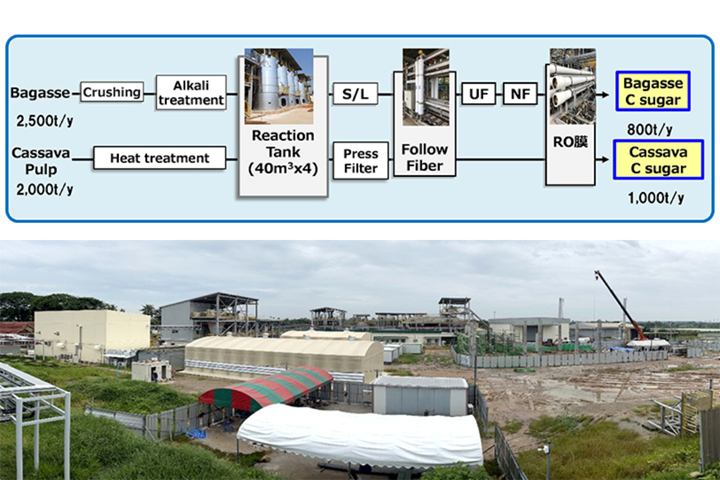Toray boosts stake in Thai subsidiary to upgrade cellulosic sugar production
Its work to produce bio-based fibers, resins and films will be augmented through a 84.4% stake and a larger facility to enable commercial production of 100,000 metric tons of cellulosic sugar annually by 2030.
Share
An overview of Cellulosic Biomass Technology’s (CBT) cellulosic sugar production technology (top) and CBT’s facility as of August 2023. Photo Credit: Toray Industries
Toray Industries Inc. (Tokyo, Japan) has invested a further ¥1.2 billion ($8.1 million) in Cellulosic Biomass Technology Co. Ltd. (CBT, Bangkok, Thailand), lifting its stake in the subsidiary from 67% to 84.4%. CBT was established in Bangkok with Mitsui DM Sugar Co. Ltd. (Japan) in January 2017 to demonstrate membrane-based saccharification process technologies; Toray also made an announcement about its working with Mitsui in April 2023 to manufacture sugars from inedible biomass for the production of fibers, resins and films. Toray now looks to employ the additional capital to draw on cellulosic sugar production technology to swiftly commercialize key polymer materials derived from this inedible biomass.
Toray is aiming for recycled resources to account for 20% of the raw materials in key polymer products by 2030 (read “Bio-based acrylonitrile for carbon fiber manufacture” for related information). It is developing a range of technologies, including to recycle used plastic products, switch to biomass-derived materials and tap carbon dioxide as a raw material.
To date, the company has created an energy-saving production technology that uses membrane separation technology to make cellulosic sugar derived from bagasse, an inedible biomass remaining after extracting juice from sugarcane. It has also innovated a technology to coproduce polyphenol, a high value-added product offering from bagasse.
Another application of the additional capital will be to augment an existing setup for manufacturing cellulosic sugar from bagasse with new facilities set up at CBT to produce such sugar from cassava pulp. This would boost the production capacity of this sugar to five metric tons daily. Toray will install boilers that can burn biomass fuels and increase wastewater treatment capacity to reduce utilities costs in making cellulosic sugar.
Toray has confirmed that the cellulosic sugar made using this technology can be used in microbial fermentation for manufacturing chemicals and is stable during storage and transportation. The Toray Group will use sugar that CBT produces from inedible raw materials for various chemical raw materials groupwide and for development of adipic acid in-house. For a fee, CBT will provide cellulosic sugar to chemical companies already making chemicals from the sugar from edible biomass and cultivate business partnerships with companies using biomass as a feedstock. CBT will additionally collaborate with domestic and overseas companies to develop the market for high value-added polyphenols.
Toray seeks to commercially produce around 100,000 metric tons of cellulosic sugar annually by 2030. It aims to contribute to a circular economy by building a supply chain for polymer materials made from this sugar.
This cellulosic sugar technology is an outcome of support under a New Energy and Industrial Technology Development Organization International Demonstration Project during fiscal 2016 through and joint development with Mitsui DM Sugar. With that project completed, CBT bought the demonstration facilities and is pushing forward with commercialization efforts.
Related Content
-
Hexagon Purus Westminster: Experience, growth, new developments in hydrogen storage
Hexagon Purus scales production of Type 4 composite tanks, discusses growth, recyclability, sensors and carbon fiber supply and sustainability.
-
Watch: A practical view of sustainability in composites product development
Markus Beer of Forward Engineering addresses definitions of sustainability, how to approach sustainability goals, the role of life cycle analysis (LCA) and social, environmental and governmental driving forces. Watch his “CW Tech Days: Sustainability” presentation.
-
CirculinQ: Glass fiber, recycled plastic turn paving into climate solutions
Durable, modular paving system from recycled composite filters, collects, infiltrates stormwater to reduce flooding and recharge local aquifers.




